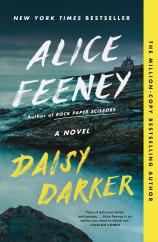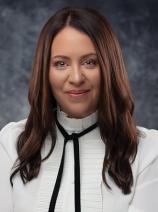Excerpt
Excerpt
Daisy Darker

1
I was born with a broken heart.
The day I arrived into this lonely little world was also the first time I died. Nobody spotted the heart condition back then. Things weren’t as sophisticated in 1975 as they might be now, and my blue coloring was blamed on my traumatic birth. I was a breech baby, to complicate matters further. The weary doctor told my father to choose between me or my mother, explaining apologetically, and with just a hint of impatience, that he could only save one of us. My father, after a brief hesitation he would spend the rest of his life paying for, chose his wife. But the midwife persuaded me to breathe—against all their odds and my better judgment—and a hospital room full of strangers smiled when I started to cry. Everyone except for my mother. She wouldn’t even look at me.
My mother had wanted a son. She already had two daughters when I was born, and chose to name us all after flowers. My eldest sister is called Rose, which turned out to be strangely appropriate as she is beautiful but not without thorns. Next to arrive, but still four years ahead of me, was Lily. The middle child in our floral family is pale, and pretty, and poisonous to some. My mother refused to name me at all for a while, but when the time came, I was christened Daisy. She is a woman who only ever has a plan A, so none of us were given the contingency of a middle name. There were plenty of other—better—options, but she chose to name me after a flower that often gets picked, trampled on, or made into chains. A mother’s least favorite child always knows that’s what they are.
It’s funny how people grow into the names they are given. As though a few letters arranged in a certain order can predict a person’s future happiness or sorrow. Knowing a person’s name isn’t the same as knowing a person, but names are the first impression we all judge and are judged by. Daisy Darker was the name life gave me, and I suppose I did grow into it.
The second time I died was exactly five years after I was born. My heart completely stopped on my fifth birthday, perhaps in protest, when I demanded too much of it by trying to swim to America. I wanted to run away, but was better at swimming, so hoped to reach New York by lunchtime with a bit of backstroke. I didn’t even make it out of Blacksand Bay and—technically—died trying. That might have been the end of me were it not for the semi-deflated orange armbands that kept me afloat, and my ten-year-old sister, Rose. She swam out to save me, dragged me back to shore, and brought me back to life with an enthusiastic performance of CPR that left me with two cracked ribs. She’d recently earned her first aid badge at Brownies. Sometimes I suspect she regretted it. Saving me, I mean. She loved that badge.
My life was never the same after I died a second time because that’s when everyone knew for sure what I think they already suspected: that I was broken.
The cast of doctors my mother took me to see when I was five all delivered the same lines, with the same faces, as though they had rehearsed from the same sad little script. They all agreed that I wouldn’t live beyond the age of fifteen. There were years of tests to prove how few years I had left. My condition was unusual, and those doctors found me fascinating. Some traveled from other countries just to watch my open-heart surgeries; it made me feel like a superstar and a freak at the same time. Life didn’t break my heart, despite trying. The irregular ticking time bomb inside my chest was planted before birth—a rare congenital glitch.
Living longer than life had planned required a daily cocktail of beta blockers, serotonin inhibitors, synthetic steroids, and hormones to keep me, and my heart, ticking. If that all sounds like hard work and high maintenance, that’s because it was, especially when I was only five years old. But children are more resilient than adults. They’re far better at making the most of what they have, and spend less time worrying about what they haven’t. Technically, I’d already died eight times before I was thirteen, and if I’d been a cat, I would have been concerned. But I was a little girl, and I had bigger things than death to worry about.
Twenty-nine years after my traumatic arrival, I’m very grateful to have had more time than anyone predicted. I think knowing you might die sooner rather than later does make a person live life differently. Death is a life-changing deadline, and I’m forever in debt to everyone who helped me outstay my welcome. I do my best to pay it forward. I try to be kind to others, as well as to myself, and rarely sweat the small stuff these days. I might not have much in terms of material possessions, but that sort of thing never really mattered to me. All in all, I think I’m pretty lucky. I’m still here, I have a niece whom I adore spending time with, and I’m proud of my work volunteering at a care home for the elderly. Like my favorite resident says every time she sees me: the secret to having it all is knowing that you already do.
Sometimes people think I’m younger than my years. I’ve been accused of still dressing like a child on more than one occasion—my mother has never approved of my choice in clothes—but I like wearing dungaree dresses and retro T-shirts. I’d rather wear my long black hair in intricate braids than get it cut, and I’m clueless when it comes to makeup. I think I look good, considering all the bad things that have happened to me. The only visual proof of my condition is carved down the middle of my chest in the form of a faded pink scar. People used to stare if I wore something that revealed it: bathing suits, V-neck sweaters, or summer dresses. I never blamed them. I stare at it too sometimes; the mechanics of my prolonged existence fascinate me. That pink line is the only external evidence that I was born a little bit broken. Every couple of years during my slightly dysfunctional childhood, doctors would take it in turns to open me up again, have a look inside, and do a few repairs. I’m like an old car that probably shouldn’t still be on the road, but has been well looked after. Though not always and not by everyone.
Families are like fingerprints; no two are the same, and they tend to leave their mark. The tapestry of my family has always had a few too many loose threads. It was a little frayed around the edges long before I arrived, and if you look closely enough, you might even spot a few holes. Some people aren’t capable of seeing the beauty in imperfection, but I always loved my nana, my parents, and my sisters. Regardless of how they felt about me, and despite what happened.
My nana is the only person in my family who loved me unconditionally. So much so, she wrote a book about me, or at least about a little girl with the same name. If mine sounds familiar, that is why. Daisy Darker’s Little Secret is a bestselling children’s book, which my nana wrote and illustrated. It can be found in almost every bookstore around the world, often nestled between The Gruffalo and The Very Hungry Caterpillar. Nana said she chose to borrow my name for the story so that—one way or another—I could live forever. It was a kind thing to do, even if my parents and sisters didn’t think so at the time. I suspect they wanted to live forever too, but they settled for living off the book’s royalties instead.
Nana had more money than she knew what to do with after writing that book, not that you’d know it to look at her. She has always been a generous woman when it comes to charity and strangers, but not with herself or her family. She believes that having too much makes people want too little, and has always hesitated when asked for handouts. But that might be about to change. Many years ago, long before I was born, a palm reader at a fair in Land’s End told my nana that she wouldn’t live beyond the age of eighty. She’s never forgotten it. Even her agent knows not to expect any more books. So tomorrow isn’t just Halloween, or Nana’s eightieth birthday. She thinks it’s her last, and they think they might finally get their hands on her money. My family haven’t all been in the same place at the same time for over a decade, not even for my sister’s wedding, but when Nana invited them to Seaglass one last time, they all agreed to come.
Her home on the Cornish coast was the setting for my happiest childhood memories. And my saddest. It was where my sisters and I spent every Christmas and Easter, as well as the long summer holidays after my parents got divorced. I’m not the only one with a broken heart in my family. I don’t know whether my parents, or my sisters, or even Nana’s agent take the palm reading about her imminent death seriously, but I do. Because sometimes the strangest things can predict a person’s future. Take me and my name for example. A children’s book called Daisy Darker’s Little Secret changed my family forever and was a premonition of sorts. Because I do have a secret, and I think it’s time I shared it.
Copyright © 2022 by Diggi Books Ltd
Daisy Darker
- Genres: Fiction, Mystery, Psychological Suspense, Psychological Thriller, Suspense, Thriller
- paperback: 352 pages
- Publisher: Flatiron Books
- ISBN-10: 1250843944
- ISBN-13: 9781250843944



